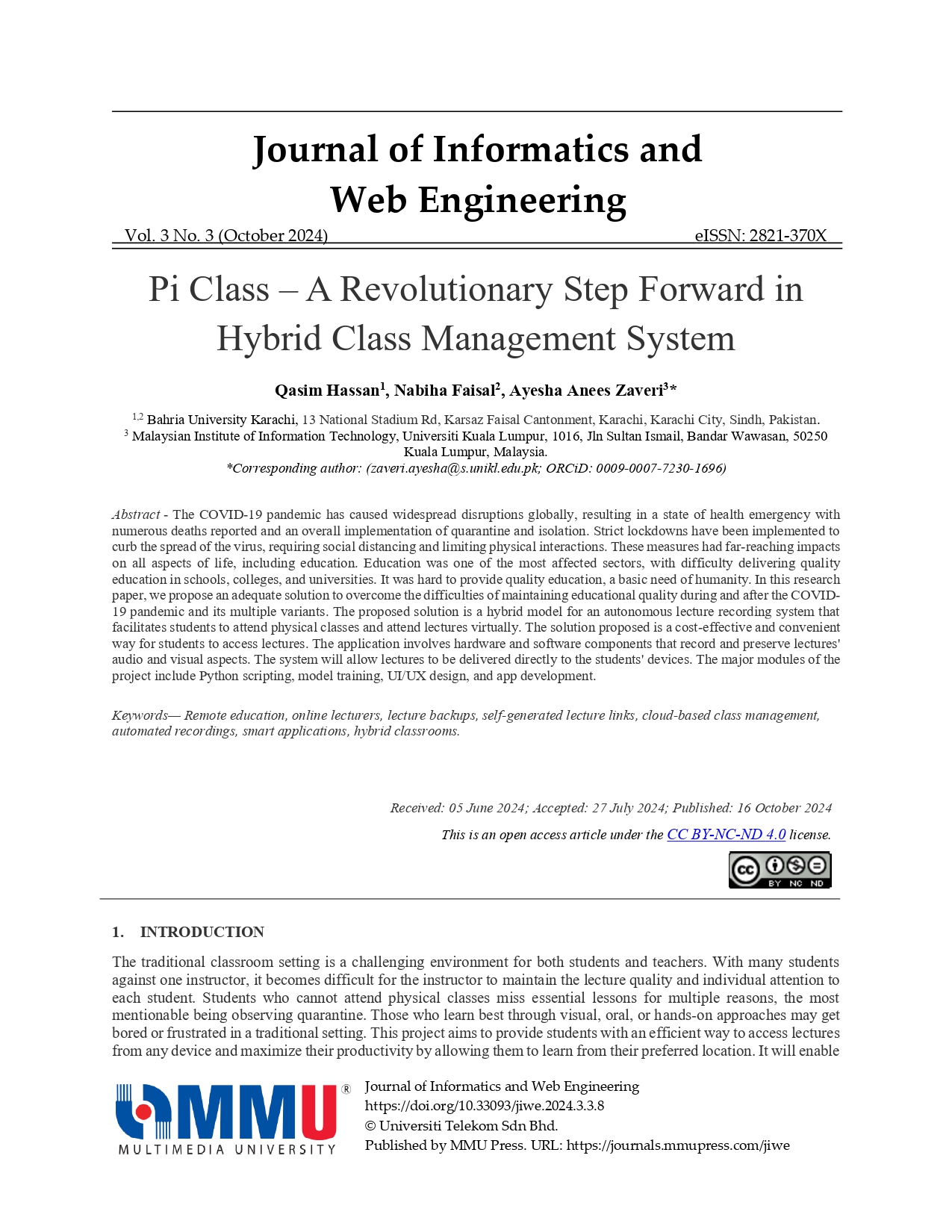Pi Class – A Revolutionary Step Forward in Hybrid Class Management System
Main Article Content
Abstract
The COVID-19 pandemic has caused widespread disruptions globally, resulting in a state of health emergency with numerous deaths reported and an overall implementation of quarantine and isolation. Strict lockdowns have been implemented to curb the spread of the virus, requiring social distancing and limiting physical interactions. These measures had far-reaching impacts on all aspects of life, including education. Education was one of the most affected sectors, with difficulty delivering quality education in schools, colleges, and universities. It was hard to provide quality education, a basic need of humanity. In this research paper, we propose an adequate solution to overcome the difficulties of maintaining educational quality during and after the COVID-19 pandemic and its multiple variants. The proposed solution is a hybrid model for an autonomous lecture recording system that facilitates students to attend physical classes and attend lectures virtually. The solution proposed is a cost-effective and convenient way for students to access lectures. The application involves hardware and software components that record and preserve lectures' audio and visual aspects. The system will allow lectures to be delivered directly to the students' devices. The major modules of the project include Python scripting, model training, UI/UX design, and app development.
Article Details

This work is licensed under a Creative Commons Attribution-NonCommercial-NoDerivatives 4.0 International License.
All articles published in JIWE are licensed under a Creative Commons Attribution-NonCommercial-NoDerivatives 4.0 International (CC BY-NC-ND 4.0) License. Readers are allowed to
- Share — copy and redistribute the material in any medium or format under the following conditions:
- Attribution — You must give appropriate credit, provide a link to the license, and indicate if changes were made. You may do so in any reasonable manner, but not in any way that suggests the licensor endorses you or your use;
- NonCommercial — You may not use the material for commercial purposes;
- NoDerivatives — If you remix, transform, or build upon the material, you may not distribute the modified material.
References
M. F. Alomari and I. Journal, “Does E-Learning Give a Better Result than Traditional Learning?,” IJCSMC, 2018. https://www.academia.edu/37429718/Does%20eLearning_Give_a_Better_Result_than_Traditional_Learning?show_app_store_popup=false
A. R. Rao and R. Dave, “Developing hands-on laboratory exercises for teaching STEM students the internet-of-things, cloud computing and blockchain applications,” IEEE Xplore, 2019, doi: 10.1109/ISECon.2019.8882068.
N. S. Yamanoor and S. Yamanoor, "High quality, low cost education with the Raspberry Pi," 2017 IEEE Global Humanitarian Technology Conference (GHTC), USA, pp. 1-5, 2017. doi: 10.1109/GHTC.2017.8239274.
F. Salih and M. S. A. Omer, "Raspberry pi as a Video Server," 2018 International Conference on Computer, Control, Electrical, and Electronics Engineering (ICCCEEE), Khartoum, Sudan, 2018, pp. 1-4, doi: 10.1109/ICCCEEE.2018.8515817.
L. Vokorokos, M. Uchnár E. Pietriková, "The Raspberry Pi in an Education Process," IEEE International Symposium on Applied Computational Intelligence and Informatics (SACI), Timisoara, Romania, 2018, pp. 000087-000090, doi: 10.1109/SACI.2018.8440999.
A.I. Bhatkar, F. Choudhary, F. Khan, S. Khan, "Smart lecture delivery system using Raspberry Pi," International Journal of Advanced Research in Computer Engineering & Technology (IJARCET), vol. 4, no. 3, pp. 1-4, Mar. 2015.
Huu-Quoc Nguyen, Ton Thi Kim Loan, Bui Dinh Mao Eui-Nam Huh, "Low cost real-time system monitoring using Raspberry Pi," International Conference on Ubiquitous and Future Networks, Sapporo, Japan, 2015, pp. 857-859, doi: 10.1109/ICUFN.2015.7182665.
R. Danymol, T. Ajitha and R. Gandhiraj, "Real-time communication system design using RTL-SDR and Raspberry Pi," International Conference on Advanced Computing and Communication Systems, India, 2013, pp. 1-5, doi: 10.1109/ICACCS.2013.6938691.
“Pricing,” Powershop, 2020. https://www.powershop.co.nz/need-to-knows/pricing/
Li and J. Kiang, "Evaluation of Small-Screen TFT LCD for Portable Devices," IEEE Conference on Electron Devices and Solid-State Circuits, Tainan, 2007, pp. 1121-1124.
M. C. Brian, "Complementary podcasted and face-to-face lectures: Students' preferences and their perceived future value," in World Conference on Educational Multimedia, Hypermedia & Telecommunications (ED-Media 2009), pp. 427-432, 2009.
M. Ketterl, R. Mertens, O. Vornberger, "Bringing Web 2.0 to Web Lectures," International Journal of Interactive Technology and Smart Education (ITSE), vol. 6, no. 2, pp. 82-96, 2009.
S. J. Davis, A. Connolly, E. Linfield, "Lecture capture: Making the most of face-to-face," Engineering Education, 4(2), 4–13. https://doi.org/10.11120/ened.2009.04020004
R. Wang, K. Mattick, E. Dunne, "Medical students' perceptions of video-linked lectures and video-streaming," ALT J Research in Learning Technology, vol. 18, no. 1, pp. 19-27, Mar. 2010.
Secker, S. Bond, S. Grussendorf, “Original citation: Originally presented at ALT-C 2010,” 2010. https://eprints.lse.ac.uk/29184/2/Lecture_capture_(LSERO_version).pdf
H. Al-Nashash and C. Gunn, "Lecture capture in engineering classes: Bridging gaps and enhancing learning," Educational Technology & Society, vol. 16, no. 1, pp. 69-78, 2013.
http://virtualclassroom.co.in/lecturerecordingsystem/
S. Song, X. Zhong, H. Li, J. Du, F. Nie, "Smart Classroom: From Conceptualization to Construction," International Conference on Intelligent Environments, Shanghai, 2014, pp. 330-332, doi: 10.1109/IE.2014.56.
C. H. Chang, "Smart Classroom Roll Caller System with IOT Architecture," 2011 Second International Conference on Innovations in Bio-inspired Computing and Applications, Shenzhen, 2011, pp. 356-360, doi: 10.1109/IBICA.2011.94.
H. Bargaoui and R. Bdiwi, "Smart classroom: Design of a gateway for ubiquitous classroom," 2014 International Conference on Web and Open Access to Learning (ICWOAL), Dubai, 2014, pp. 1-4, doi: 10.1109/ICWOAL.2014.7009206.

